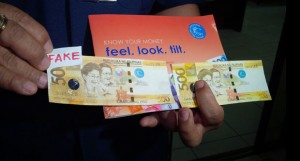Police to apply ‘last touch principle’ amid proliferation of fake money

Superintendent Alexander Tagum, Chief of the Criminal Investigation and Detection Group Anti-Organized Crime Unit, placing side-by-side counterfeit P500 bill to the original. JULLIANE LOVE DE JESUS/INQUIRER.net
MANILA, Philippines– If you happen to receive counterfeit money, be smart; turn it over immediately to police to avoid trouble.
The Philippine National Police on Thursday said authorities are now applying the “last-touch principle” due to the proliferation of counterfeit notes.
“We will apply the last-touch principle. If you purchase an item using fake money, and the establishment files a complaint, you will automatically be summoned by the police,” said Superintendent Alexander Tagum of the Criminal Investigation and Detection Group Anti-Organized Crime Unit.
Police seized recently several pieces of counterfeit money in Taguig City from a couple following a month-long surveillance.
Expressing alarm over criminals brazenly selling fake money, Tagum said the fake bills have already reached some provinces in the Visayas and Luzon.
Article continues after this advertisementHe said criminals engage in the production of counterfeit peso bills because of the big financial return.
Article continues after this advertisement“With just P150, a middleman can sell a P500 bill or higher. It has become a business to the dealers because of the good return of their investment,” he said.
While the investigation is ongoing, the CIDG AOCU is still tracking down the dealers and the printing machine they are using.
“The BSP told us that these criminals use advanced and high-level printers now that they can imprint the security seal,” he said.
Imprisonment
A person who is caught selling, distributing or even recycling counterfeit bills could be jailed if he is proven guilty of the committing the act.
Tagum said the offender will be put behind bars in not less than five years but not more than 10 years.
“In case the revised penal code provides for the greater penalty, then the penalty shall be imposed,” he added.
How to spot fake bills
Police said one only has to “look, feel and tilt” to determine a counterfeit bill.
First, “look” at the bill.
“If you look closely, the original bill’s print is very sharp,” Tagum said, noting that the prints of the fake ones appear blurry.
But with the availability of advanced printing equipment, he said many people would most likely be fooled.
Second, “feel” the bill.
“The texture of the original bill is thick and coarse, while the fake ones are smooth,” Tagum said.
Finally, “tilt” the money.
“If you tilt the genuine P500 bill, you will see a watermark of our national heroes Cory Aquino and Ninoy Aquino,” he said.
Also, the national bird in the security seal of an original bill is “prominently imprinted.”
“But the good thing here is that when paper bills are subjected to Ultraviolet Light (scanner), it can easily detect fake bills,” he said.
The official also urged vendors, who cannot afford UV light scanners, to buy a UV light pen for easy detection of fake bills.
RELATED STORIES
Warning up on fake peso bills
Suspected maker of counterfeit peso bills arrested in Cebu